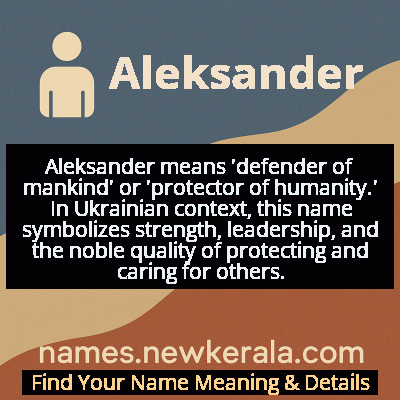Aleksander Name Meaning & Details
Origin, Popularity, Numerology Analysis & Name Meaning of Aleksander
Discover the origin, meaning, and cultural significance of the name ALEKSANDER. Delve into its historical roots and explore the lasting impact it has had on communities and traditions.
Name
Aleksander
Gender
Male
Origin
Ukrainian
Lucky Number
9
Meaning of the Name - Aleksander
Aleksander means 'defender of mankind' or 'protector of humanity.' In Ukrainian context, this name symbolizes strength, leadership, and the noble quality of protecting and caring for others.
Aleksander - Complete Numerology Analysis
Your Numerology Number
Based on Pythagorean Numerology System
Ruling Planet
Mars
Positive Nature
Generous, passionate, energetic, and humanitarian.
Negative Traits
Impulsive, impatient, moody, and can be overly emotional.
Lucky Colours
Red, maroon, scarlet.
Lucky Days
Tuesday.
Lucky Stones
Red coral, garnet.
Harmony Numbers
1, 2, 3, 6.
Best Suited Professions
Military, sports, philanthropy, leadership roles.
What People Like About You
Courage, energy, leadership, generosity.
Famous People Named Aleksander
Aleksander Fredro
Playwright and Poet
Considered Poland's greatest comedic playwright, author of 'Zemsta' (The Revenge)
Aleksander Kwaśniewski
Politician
President of Poland from 1995 to 2005, oversaw Poland's accession to NATO and EU
Aleksander Gierymski
Painter
Prominent Polish realist painter, known for his urban scenes and social realism
Aleksander Wielki (Alexander the Great)
Military Commander and Ruler
Created one of the largest empires in ancient history, stretching from Greece to India
Name Variations & International Equivalents
Click on blue names to explore their detailed meanings. Gray names with will be available soon.
Cultural & Historical Significance
Throughout history, bearers of this name have often been associated with military prowess, intellectual achievement, and national leadership, making it a name that conveys both historical weight and aspirational qualities. In modern Ukrainian context, the name maintains its traditional appeal while also representing continuity with European cultural traditions. The name appears frequently in literature, historical records, and contemporary media, reinforcing its status as a name of substance and character. Its widespread use across different social classes and regions demonstrates its enduring appeal and cultural integration.
Extended Personality Analysis
Individuals named Aleksander are typically perceived as natural leaders with strong protective instincts and a commanding presence. They often exhibit confidence, determination, and strategic thinking, reflecting the name's meaning as 'defender of mankind.' These individuals tend to be ambitious yet responsible, with a deep sense of duty toward those in their care. Their personality often combines intellectual curiosity with practical problem-solving abilities, making them effective in both academic and professional settings.
Aleksanders are frequently described as charismatic and persuasive, able to inspire others while maintaining a calm, composed demeanor even under pressure. They value honor and integrity, and their protective nature extends beyond physical defense to include emotional support and guidance for family, friends, and community. While they can be assertive when necessary, they typically balance this with empathy and consideration for others' perspectives. This combination of strength and sensitivity makes them well-rounded individuals capable of handling complex social and professional situations with grace and effectiveness.
Modern Usage & Popularity
In contemporary times, Aleksander remains a popular and respected name throughout Eastern Europe, particularly in Ukraine, Poland, and Russia. The name maintains steady popularity, often ranking within the top 50 names in these countries. While traditional in essence, it has adapted well to modern sensibilities, appealing to parents seeking a name with historical depth that also sounds strong and international. In Ukraine, the variant 'Oleksandr' is particularly common and carries strong national significance. The name's popularity has been reinforced by successful contemporary bearers in politics, sports, and entertainment. Recent trends show that while some parents opt for more modern or Western variations, Aleksander continues to be chosen by those valuing cultural heritage, strength of character, and timeless appeal. The name's international recognizability also makes it practical for global mobility and professional contexts.
Symbolic & Spiritual Meanings
Symbolically, Aleksander represents protection, leadership, and humanistic values. The name embodies the archetype of the guardian or protector, symbolizing strength used in service of others rather than for personal gain. It carries connotations of wisdom combined with action, reflecting the ideal of the philosopher-king or enlightened leader. The name also symbolizes cultural bridge-building, as its variations appear across multiple languages and cultures, representing unity and shared human values. In metaphorical terms, Aleksander suggests a person who stands as a bulwark against adversity, a unifier of people, and a champion of justice. The name's historical association with Alexander the Great adds layers of symbolism related to exploration, cultural exchange, and the expansion of human knowledge and understanding across boundaries. This rich symbolic tapestry makes the name carry weight beyond its literal meaning, representing ideals of leadership, protection, and cultural continuity.

